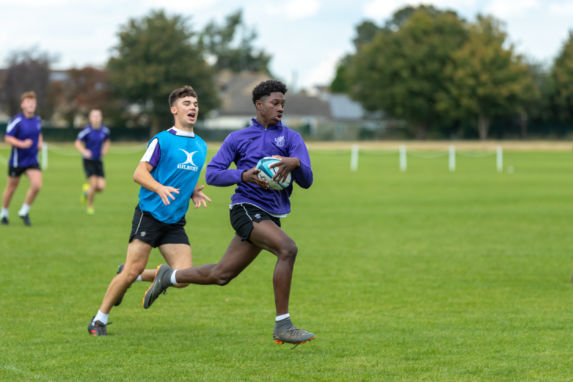Language
Date Posted: 19th August
Categories: Sixth Form
Choosing to study at a independent Sixth Form in the UK is a great decision if you want to open up a whole host of opportunities and make positive steps towards a bright future. Private Sixth Form is usually the next step after attending an independent school in the UK, but you may also be considering private Sixth Form in the UK from abroad. Here we’re looking more closely at everything private Sixth Form in the UK can offer and the opportunities it brings.
A private or independent Sixth Form, also referred to as Year 12 and 13, is a school offering post-16 education in a private setting. Many private Sixth Forms are attached to independent schools though there are some fully independent private Sixth Form institutions too. They differ from state Sixth Forms due to fees being paid, and soin most instances, the level of education, access to opportunities like extracurricular activities and university preparation is higher in a private setting.
Sixth form education in the UK is a chance to gain the academic qualifications and preparation needed for university. It is the period where pupils transition into students and move on from their GCSE qualifications to further education. Private Sixth Form includes career and university preparation, including preparing for elite US university examinations and other student-specific requirements.

UK Sixth Form is the first stage of education after school. Students are usually 16 to 18 and attend Sixth Form before undergraduate level at university.
Sixth form refers to the last two years of secondary education in England, Wales and Northern Ireland. They are commonly referred to as years 12 and 13 in schools, although students can attend a college and simply be in their first or second year as they have moved on from school.
In most Sixth Forms, the students’ maturity is recognised, and they do not have to wear the standard school uniform. Instead, they are expected to wear clothing appropriate to their position as senior members and representatives of the Sixth Form. This usually means both male and female students opt for smart suits, tailored outfits and similar. Different Sixth Forms do have their own rules that you can explore before deciding on the right school for you.
Private Sixth Forms charge fees, which is the main difference between them and state Sixth Form schools and colleges. However, private Sixth Forms also give students the chance to access a wider curriculum and further opportunities such as diverse extracurricular opportunities and support and coaching for university interviews and entrance exams,and they will often have smaller class sizes and so higher levels of personalised tuition.
Sixth forms offer an extensive range of different options for students, intending to equip them with the qualifications they need for university entry or a specific career path. Private Sixth Forms focus on the academic side of education, helping students prepare as well as possible for their chosen university course.

Sixth forms usually offer a range of A Level subjects, and they may also offer foundation courses and the International Baccalaureate Diploma, and more vocational qualifications such as the Cambridge Technicals and BTecs. Students may need to select their subjects with university entrance in mind. It is worth exploring the entry requirements for certain universities before signing up for specific A-Levels or other courses.
Sixth form college offers a similar provision as school Sixth Form, but they often offer other qualifications and courses too. They may have access courses, adult education, apprenticeships, and even bachelor’s degrees in some instances. Private Sixth Forms are usually attached to independent schools, while colleges are separate state-funded institutions.
The International Baccalaureate is a globally recognised qualification for university entry, but UK A Levels are also a great choice too. Both options are studied over two years. A Levels give students the chance to study between three and four subjects in depth, while the IB covers six subjects more holistically. A Levels are entirely down to the student’s personal choice, while the IB has compulsory elements including Theory of Knowledge, an Extended Essay and Creativity, Action, and Service activities.
Almost all A Levels combine coursework and examinations. There are usually final examinations at the end of the course, and students will receive their results in the August before university begins. Students usually have a conditional or unconditional university offer based on the results they hope to achieve.
Sixth form is often seen as a stepping stone to university, but this isn’t always the path students take. You could use Sixth Form as an opportunity to build your education before entering the world of work. Similarly, many people go on to find an apprenticeship after Sixth Form and begin their career in a specific chosen field.
The level of learning and academic expectations at Sixth Form level is a significant step up from the final years of school. Students have the chance to explore a wider range of subjects but also get used to managing their time independently with free periods and study time. Your time at Sixth Form is a chance to research and discover lots about university life while surrounded by like-minded people.
Choosing a Sixth Form should be something you take time over. You may have a preferred school or college, or you may have other requirements to consider. Choosing a Sixth Form involves a lot of decisions such as whether it offers the right courses, whether you are ready to consider education in England from abroad and other important factors such as the pastoral care and support available. It is highly recommended to visit the Sixth Forms you are considering in advance or speak to the Head of Sixth Form, as well as the following factors.

Some Sixth Forms offer boarding for students who want to live on-site and immerse themselves in school life. This may also be your best option as an international student. Boarding brings a wealth of opportunity, but day students also have plenty of chances to feel part of and benefit from all aspects of Sixth Form in the UK. Learn more about boarding at Wycliffe.
You may have a specific university in mind and want to study at a Sixth Form nearby. Alternatively, you may be looking for the best possible Sixth Form in your local area. Considering the location of your chosen Sixth Form is important for making the most of your time there.
Not all pupils finishing secondary education know what they want from their future careers. However, the right Sixth Form courses will impact your options at university level, so ensuring you can study the right subjects is vital. If you aren’t yet sure what your post-Sixth Form plan is, finding somewhere which offers the subjects you excel in and enjoy is the most important thing.
Both students and their families should want to find a Sixth Form with a strong and proven reputation. Private Sixth Forms typically achieve exceptional results they are proud to share via their website and on open days and visits to their campus.
Independent Sixth Forms are designed to help students maximise their potential and achieve their goals in terms of academic success, career readiness and preparation for university and/or the world or work. Students, in turn, must put in the necessary effort and commitment to achieve these goals. Sixth form can be hard work but also great fun and highly rewarding if you keep these tips for success in mind:

Studying subjects, you don’t enjoy can be a thing of the past at Sixth Form level. Students can select the subjects they love but also keep in mind career or academic goals. There is an increase in workload compared with GCSE level, which is why students specialise and choose a smaller number of subjects.
Good organisation stands you in good stead for your future career or academic choices. Wider reading and comprehending related source materials is key to succeeding at Sixth Form, and this takes a level of independent organisation not needed at school. Get used to using a diary, setting and sticking to deadlines and developing an organised approach to work.
Students at Sixth Form will experience free periods for the first time. While these don’t always need to be used for study, ensuring you make the most of them will be beneficial when it comes to revision and exam time. Find your most effective working environment and ensure at least some of those free periods are spent focused on studies.
Wycliffe private Sixth Form is a leading independent school with a dedicated Sixth Form. Our commitment to our standards and educational excellence means we attract students from around the world and deliver a high level of post-16 education to all.

Wycliffe is proud to offer a diverse range of subjects from those you’d expect in every institution to more specialised options unavailable in the average Sixth Form, such as Japanese. We offer a choice of 27 A Levels, three BTecs in Digital Production, Sport and Business, and the Extended Project Qualification. Our students benefit from individualised learning to enhance their opportunities.
We pride ourselves on giving our students much more than just a classroom experience. Our extensive and diverse extracurricular programme ensures there is something for everyone. Our Sixth Form students can immerse themselves in every bit of Wycliffe life with opportunities in everything from beekeeping and fencing to green car racing and performing arts. We nurture our student’s talents and passions both academically and in their personal passions and interests.
We strive to ensure every student has the opportunity to achieve the best they can. Our Extended Project Qualification, university application and career support and commitment to high academic achievement mean we have supported pupils to gain places at some of the world’s most prestigious universities in the UK, US and around the world. In 2021, 75% of pupils achieved A Level at grades A*, A or B.
Our beautiful countryside location provides peace and tranquillity but also easy access to London. Our school is set over 52 acres of secure country land near Stonehouse in Gloucestershire. You can reach London within 90 minutes and Bristol within 45.
For international students considering Wycliffe, our boarding programme may be most suitable. It is also an option for any student who wants or needs accommodation while they study. Sixth form students stay in our senior school boarding houses, and we are proud to have boarders from around over 25 different countries.
As an independent school Wycliffe College charges fees for students entering our Sixth Form. We are happy to discuss fees with any prospective student and our family. Furthermore, we offer scholarship programmes for pupils who demonstrate excellence as an all-rounder or have a special talent in sport (rugby football, netball, hockey, squash and rowing), music, drama, modern foreign language, design or art. This type of Sixth Form funding allows students to flourish within our senior school and maximise their potential.
Private Sixth Forms allow students to make the most of their natural skills and talent. They are also supported to reach their potential and achieve their dreams regarding academic progression to university or finding their ideal career. Request our Year 12 to 13 guide or arrange a personal tour of Wycliffe to discuss opportunities by contacting Fiona.lawson-best@wycliffe.co.uk.
Related Articles